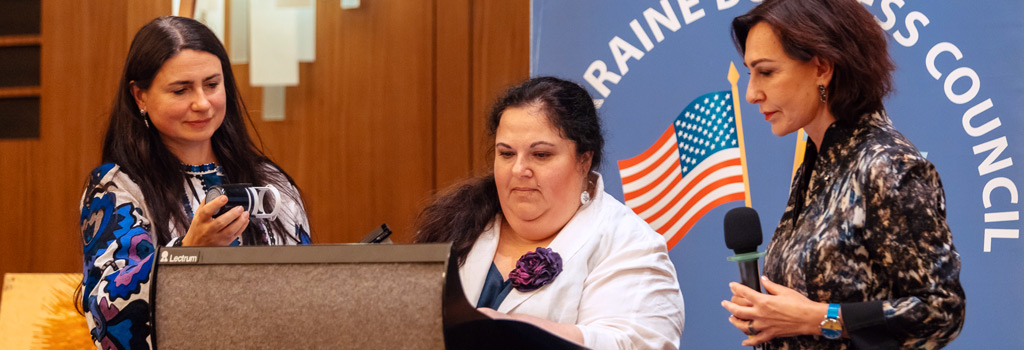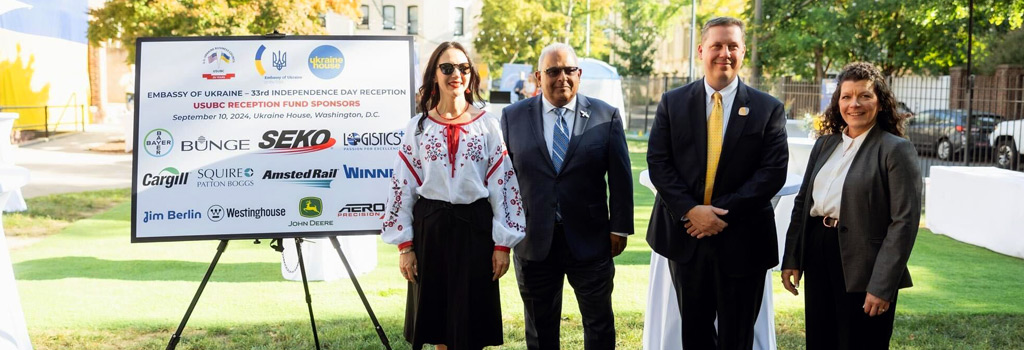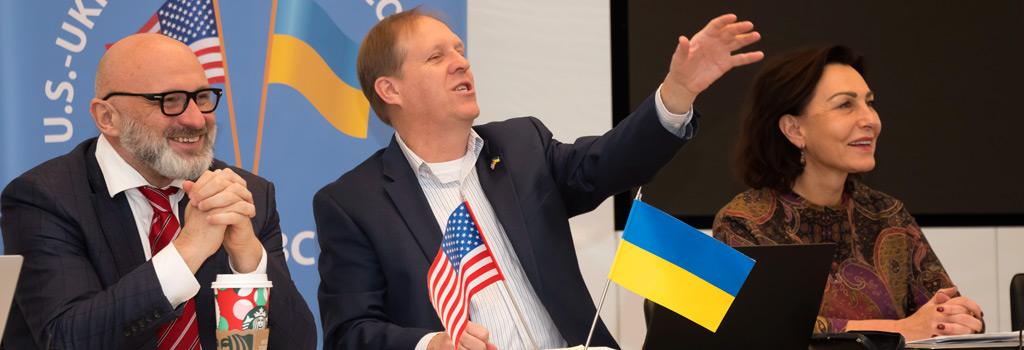News releases from usubc members
USUBC
Featured Galleries USUBC COLLECTION OF OVER 160 UKRAINE HISTORIC NEWS PHOTOGRAPHS 1918-1997 Holodomor Posters
Holodomor Posters

Featured Galleries USUBC COLLECTION OF OVER 160 UKRAINE HISTORIC NEWS PHOTOGRAPHS 1918-1997
 Holodomor Posters
Holodomor Posters

FEATURED INTERVIEW: THE PATH OF VADATURSKY
![]() Interview with Oleksiy Vadatursky, CEO of NIBULON,
Interview with Oleksiy Vadatursky, CEO of NIBULON,
A long-time member of USUBC,
Published on Economichna Pravda, Kyiv, Tue, July 19, 2016
Translated by U.S.-Ukraine Business Counicil (USUBC)
via Dialog Kyiv Translation Agency, a member of USUBC.
Washington, D.C., Thursday, July, 28, 2016
Reference on Nibulon is from Mykhailo Granchak, director investment banking, Dragon Capital:
One of the largest agri traders in Ukraine in terms of commodity volumes. In 2015/2016 the sales volumes were circa 4,6 mln tons.
- The company was founded in 1991 with the core activity to produce and sell hybrid corn and sunflower seeds of foreign origin.
- Today the company owns 23 silos with the total capacity of 1,77 mln tons with simultaneous storage in 10 regions, 9 of the latter are transshipment river terminals (the Dnieper and Southern Bug).
- Nibulon runs own fleet, constructed in the period 2009-2015. It is comprised of 33 non-self propelled barges of 142 thousand tons capacity, 12 towboats, dredges, propelled and non-propelled floating derricks. Since 2013 towboats and barges have been constructed at own shipbuilding capacitates.
- In 2015 the company transshipped about 1,6 mln commodities via rivers Dnieper and Southern Bug.
- Nibulon marine transshipment terminal in the Mykolaiv has an annual capacity of 5 million tons, and can accommodate the vessels of 10,3 meter draft.
The company processes about 83 thousand hectares of land in 13 regions of Ukraine. It also has a cattle breeding business .
- The headcount of Nibulon is about 5 thousand people.
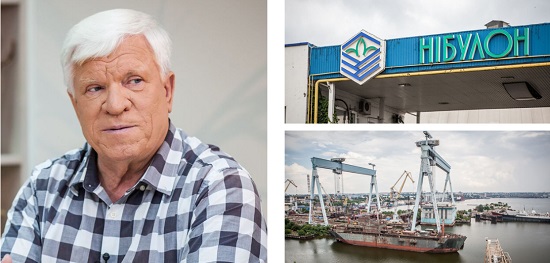
- — Who is Oleksiy Vadatursky?
- — I am a founder, the principal co-owner and managing director of Nibulon since its first days. This is my son’s and mine family business.
- — How old are you, where were you born and who are your parents?
- — I am 68 year old, I was born in farmer’s family. I used to live in the village till graduation from school. I had been working there before entering the institute. My father- the veteran of Great Patriotic War, was wounded, but he worked very hard. Mother also worked very hard. When I grew up, I wanted to make rural living better. Parents brought me up to be an honest person and I am very grateful for that.
- — What were your hobbies in school times?
- — I was interested in many things at school, in particular- growing plants and rabbits. I played harmonica and accordion. I went info sport. In 1962, when I was in the fifth grade, I was sent to Artek camp as one of top students. I spent three months there. Probably, I was one of the first rural boys, who went there.
- — What drove your choice to enter the university? Did you have a choice?
- — There was always a choice. The decision came accidentally. I had 5 friends. One day we took a train to Odessa, bought a guidebook there. Then we sat down in the park near the train station square, opened the guidebook and started deciding where to enter. All of us chose different institute. I entered Odessa Technological Institute named after Lomonosov as it was the closest to the rural life, food production, processing of agricultural commodities, respective researches etc.
- — At that time there were no talks regarding business. Was it a pure intuition?
- — I received 35- ruble scholarship. I made researches at the chair and earned 65 on that. In night shifts (in a day) I unloaded planes and got 95 rubles for that. When I graduated from the university, I was supposed to earn 120 rubles as an engineer. When I was a student, I earned much more money. Every summer I worked in students’ construction teams. I travelled throughout former USSR and earned so much money that I was able to help out my parents. I gained great experience in those teams. It influenced my personality. I learned about the problems that people have and started to understand how hard people should work to achieve something.
- — Did you see the result of work?
- — Yes, then I was a student, who had a tape recorder Riga. Very few people had that. I had a chance to have good clothes. I was a well-to-do lad. I did not go to the village often, as I was engaged in different projects during vacation: I travelled a lot, was a leader of student travel. I visited Northern Karelia, Northern Ural, Crimea during summer and winter.
- — Why did not you stay at the university?
- — I was among top students and had a chance to stay in Odessa. Today I understand that I took the right decision to leave. I was yearning for practical work and hands-on experience. I wanted to organize something. I wanted to be in the pivot, organizing something useful.
- — Where did you go to work?
- — I longed for to be occupied in other parts of former USSR, but I had been influenced for a long time and finally they talked me into going to Mykolaiv department to work in underway construction. I was interested in automation, to work for the organization, where I could go from region to region and align the work of new enterprises, but there I had to work at one enterprise, which was not broad enough for me.
- — And were you motivated?
- — There was no motivation at that time. I had to go to the village, to the premises with kitchen, where 4 families were living. Who would like to live in a train car? I was at once offered a position of chief power engineer, and it was risky to take a young person without a practical experience in electric power systems.
- — What were your strengths?
- — I had organizational skills. I was an active person. They saw a brisk manager, who was ready to organize the production on spot. So I got the position of chief power engineer. Chief engineer selected me for being a young successful innovator— I had a lot innovation certificates of former USSR and implemented many initiatives rather efficiently. There were a lot of disputes in regard my remuneration for that, but in several years they paid me as I demonstrated real results.
- I was assigned the head of construction to Mongolia. I was to be assigned in Yugoslavia or Iran, but at that time I was the secretary of Komsomol organization as deputy chief of the enterprise, and people, who occupied such positions were to be communists. So I had to enter the party. During the probation of the candidates, nobody had the right to go to the capitalistic country, only to the socialist ones. So I went to Mongolia. Upon termination of probation I could have gone to other country, but I had to work for the Soviet Union first.
- — How long have you worked there?
- — A year. Then I was offered to stay for two more years, but I turned it down as I got more attractive officers in other places of former USSR. I wanted to leave Mykolaiv region as I was not interested to work in the village. But I got the transfer to the department of milled and hulled products in Mykolaiv, where I started as head of production department and then was promoted to the deputy director. So, my entire life is connected with implementation of new technologies and construction.
- —Has Nibulon found you in that role?
- — When the iron curtain between us and Europe was removed, I understood that my life should be connected with the work abroad. I had travel a lot and saw how people were living. During USSR times I was offered to found joint Ukrainian-Hungarian-English agricultural enterprise. I came up with the title Nibulon—Nikolaev(Rus.), Budapest, London — last night before the registration.
- — Who offered it to you?
- — When you are active and mobile, with ideas how to execute nearly any project, there are incessant proposals. At that time I was offered to run the enterprise and I was interested in that. It is difficult to believe, but in 1991 we had worked without salary for two years. The first employees were enthusiastic to work. Then the Soviet Union collapsed and our company started working. We had a lot to do, as agribusiness Ukraine was about to fall.
- It dwindled. As a manager I could not have allowed a fiasco, so we tried to find out the way out and propose different option how to get by. We became an agri company, when the agrarian sector did not pay for the services. There is no culture in business relations even now, but at that time it was even worse. It was “honorable” when former USSR wrote off the debts to agrarian sector.
- — In actuality, nobody wrote off the debts .And your customers, who got supplies from you, did not pay?
- — I had to take bank loans for hundreds of annual interests. It was 1992-93 with hyperinflation 1 to 1000.
- — Was not it jeopardous to take a loan?
- — We had to calculate if we could service it. We had to reckon. We knew how to struggle and survive in this situation. In 1998 we obtained the first loan from World Bank. In April the loan was with the exchange rate of 1,8 UAH/USD, and in August 1998 the rate made 5,3 UAH/USD.
- — Did you borrow money to pay the salaries?
- — There were difficult, turbulent times for Ukraine and a lot of scuffle between business structures. There was raidering. There was a constant division of markets, and wars between groups. People died. We found the algorithm that helped us survive. We decided to: firstly, work only transparently, secondly, borrow money only from banks and thirdly, not to work with dubious business structures, only with the companies and organizations who were acting legitimately. We had about 10 items like that. This program is still effective.
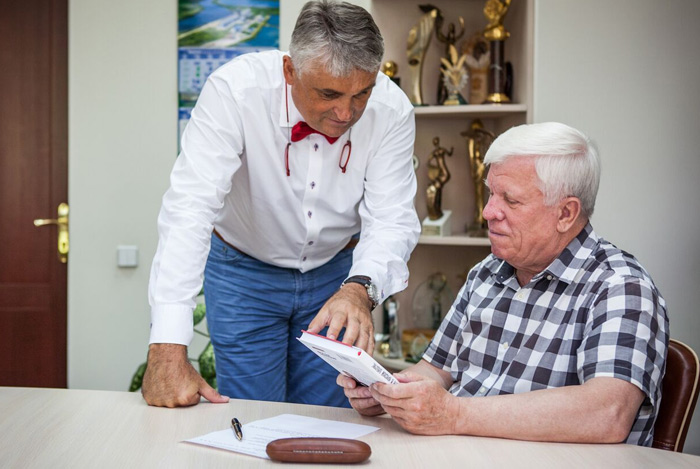
- Your son and you own 100% of shares. Would not it be simpler to get a Ukrainian or foreign investor rather than seek borrowings abroad?
- — There is a slight clarification. My son and I are co-owners of the company. My son is a Member of Parliament and he is not entitled to do business directly. He gave his share for me to manage, remaining the co-owner of the company. As for investors, life taught me, do everything at own cost. If someone gives you money, you have to return yours. You’ve got to learn how to generate money. Then you will feel the price of earned money, start planning, spending it rationally, not go for gigantomania that will lead to no effect.
- — Did cooperation with banks help you run this business efficiently?
- — We have taken decision not to work with investment funds, only with the banks, legally work and live by laws and rules, introduced by banking system. Moreover, we have an experience of getting a loan from World bank. It is a serious responsibility- to be trusted, and you are to be totally responsible and liable to bank.
- When appraisers came from Washington and saw my apartment and our office, those Tavrias, which we used to drive ,and proposed to pledge it, I said that it would be unpleasant to me to come in my apartment and understand that it is not mine, that it is pledged, take a car and know that it is pledged, go to the office and know that it is pledged. I said them in a meeting: "I need to talk to my family and I will come back to you in the morning". When I got consent from my family, the next day I met the managers from the bank and said I agreed, they responded: "We are not going to take your 2-room apartment, we understand your psychological state ".
- At that time our company was known on different levels and I even the ministers said- here is the manager of the company, who gained a footing owning to living transparently and by the rules in complicated legitimate field of our country.
- — Could Nibulon be the way it is without credits?
- — It would be impossible. When you take a credit, you get additional funding into a certain business project, which is the path for development of the company. When you clearly understand what investment you count for, and then you get the profit, there is a ground base for paying off the credit. Now banks are standing in the line to work with us, but we are currently not into just attractive proposals, we clearly understand how much money we need, what should be processed to pay off the credits duly.
- — What is Nibulon today? What does it produce? Where does it sell? What countries are your partners?
- — Today Nibulon" is the company which is perceived as port operator and a large port, or a marine shipping company, or large construction company, or logistics company, or a large agri company, grain company or the company with lion share in domestic trading. It is all true. We also have ship-building capacities. When global experts from World bank or other experts come for a visit, they say that we’d better spin off each of our branches. Others say that we have to give up agricultural production as this business is not so transparent, and risky in Ukraine due to climatic conditions.
- — Why is it so?
- — There are certain peculiarities in Ukrainian legislation. When people come from America and other countries they do not understand those issues- they have good relationship with the state as they have guarantees, but we have none. Irrespective of the Revolution of Dignity, those who are closer to the “suite” , to the “public crib”, will have more. We have not built our company with the help of the state, but contrary to all. Our company is functioning owning to my team. In the 90s I had the same problems as currently. There were 1000 people in agri sector and I wanted to be independent, not to stay in line to silo ports, to sell my grain, not to wait for traders. We made a plan and achieved our goal- we actually became independent form transnational companies, operating in Ukraine.
- — Are there many of them?
- — Many. They are operating in developed countries and serviced by banking system. We understood that we needed to have a representative office in Europe to have experience in working with European system. Those companies came to Ukraine with money, and we came to the location with accessible money of Western banks.
- — What competitive advantages enable Nibulon do better versus national and global players on Ukrainian market?
- — Large, strong and famous global companies make decisions in Washington, Geneva and Amsterdam, but people are working here. We are aware of the situation. We are growing our business and investing into the economy of Ukraine, because this is our future, the future of Ukraine.
- — Do they also pay taxes in Ukraine?
- — I would not say that in Ukraine they pay more taxes than we. They will not be concerned with our life, it is all about business. I have no way out, I am living in Ukraine and I have to survive in these conditions, competing with those players. Western investors are supported here by the representatives of their country and ambassadors , and I as a legal entity in Ukraine, owner and Ukrainian investor – I protect myself from the state. We do not have anybody to ask for help. Moreover, on global market we struggle with transnational companies, who are lobbying their interests in the countries, where we come across, and those countries are also lobbying their interests in Ukraine. I have support neither in Ukraine nor abroad. We are surviving in competitive environment, though we have reached certain success.
- — You’ve so comprehensively built your logistics, ensuring swift unloading of cars with grain, shipments that no Ukrainian company can compete with you. Why can you cope with that and others not?
- — It is not just a quicker loading and unloading cars, we are also loading and building vessels faster than others. Silo is built by us for 90-100 days from the inception of construction till commissioning.
- —Are you not scared that all will collapsed and ruined due to the current situation in Ukraine?
- — It is great to have the opportunity to invest during the crises in national or global economy. Crisis is a challenge for business and the opportunity for realization in difficult conditions. Every dollar earned today is twice as valuable as it was two years ago. Today I can purchase 30-40% of European equipment more than two years ago, irrespective of inflation in Ukraine. Today metal, oil, fuel, lubricants, chemicals etc are cheaper not only in dollars, but globally as well.
- Today I save on equipment 30-40% percent unlike other global players. They are standing in a line without knowing whom to sell those goods. Today I can tell my terms and conditions and price to suppliers. About 5-6 years ago people from metal industry did not take us seriously thinking that our business is not of a large scope, but today they understand how much metal we buying and what vessels we are building. So, they started to respect us. Now it is clear who is who, and who can successfully build in Ukraine. Crisis shows the real power of the company.
- — Is there a room for new companies in agri business?
- — Enthusiasts can always use their potential. There is a lot to do in agri sector. For example, in coming10-15 years Ukraine is supposed to have 100 mln tons of grains, so grain production volumes shall increase by 30-40%, and for these volumes are necessary to increase the intensity of agri farms. It requires new people, companies, new opportunities. To ensure logistics and shipment of the entire production, a lot of investment and large organizations are needed.
- Today silo industry encompasses over 30 mln tons of certified grain storage capacities, it means that there is a lack of 70 mln tons to store all grains. Our experience showed that 3 years ago there were less traders in Ukraine than now. Currently there are about 1500 of entities with foreign economic activity. 5-6 of them are in top 10, capturing 90% of grain market, and the rest are the companies competing for each farmer. Ukraine is focused on civilized grain market, because there is a high competition here.
- — It means that everything is honest in this business
- — There is no other way to be successful in grain business and reach our level.
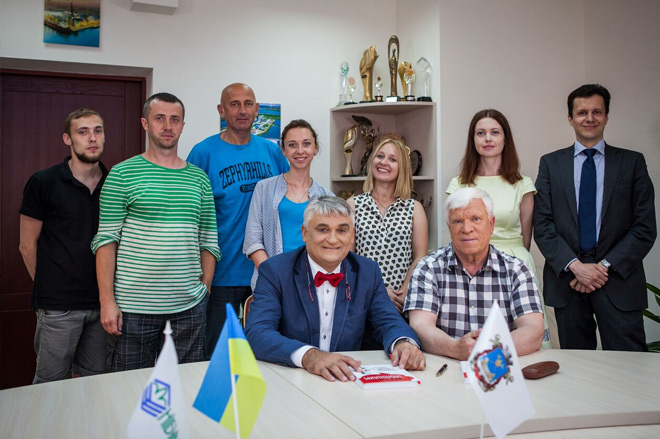
-
You have been running a company for 25 years. What are you inspired by? What are you driven by? - — Nothing will happen without a young team. Young people in our team are taught to work honestly and believe that today you can be successful working transparently. We exemplify that. We had so many bans restrictions and interferences that we are safeguarded from that.
- — Do you picture yourself under a palm tree, on vacation?
- — No. I take a 2-week vacation three times a year - sometimes with wife and grandchildren, sometimes by myself. The onlookers think that it is very hard in our company. But it is easy to work since I established the company and has worked there from day one, knowing people to the minute details, feel them and their potential.
- — It would be logical if you became the member of parliament of Ukraine, and your son would manage "Nibulon".
- —After revolution of dignity I had a conversation with the president. He asked me to join his team and execute ideas. I said that in a long time perspective Ukraine will benefit by much more , if I occupy current position. Earlier I also was offered the positions of minister or to lead certain branches, but I turned down those offers. I see that here is no place there for patriotic people who could make reforms for people, for the country and its reputation. The clan system remains there. Being an experienced person, I would not put up with that. That is why I said that this is the task for young people, who should build the future of Ukraine.
- — Do you hope that your son Andrey will come back to the company and take over your business?
- — I have different thoughts on that. We have talked about it. Probably Andrey has not decided what is better for him. He is not very pleased with his current role. There is no place for honest people there. When my company was underway, it was planned that my children and grandchildren would run it. Grandchildren do not understand that yet. It would be better if they said : "We will grow up and help you", so far they wish me to work for a long, long time.
- — Is Ukraine just a large country or the country of big opportunities, irrespective of power? What should people do? Please, share your tips.
- — I saw a lot of things in the work and I think that Ukraine is the best country, with the best opportunities. Even in such tough conditions as today, we should work and believe in future. If we are focused on civilized world, there will be the funding and investment and everything will be stabilized. I would advise to work like we. We came to success in difficult times, because we believe in the opportunities of Ukraine. Nobody knows us in other parts of the world and nobody is waiting for us as they just do not care. Everyone who comes there has to survive and struggle. No one would babysit you and make comfortable working condititons.
- Today young people should be mobilized, making the environment of those who would like to improve Ukraine, rather than waiting for someone to introduce those improvements . During my speech at the foreign forums I always say: "Dear investors and banks do not wait for Vadatursky and his team to rectify the ministers, prime minister; improve economy and combat corruption. Come and help Ukrainians to make Ukraine better". Today successful young people are well educated. Who else should struggle for better Ukraine?
LINK: http://www.epravda.com.ua/cdn/cd1/2016/07/vadatursky/index.html









